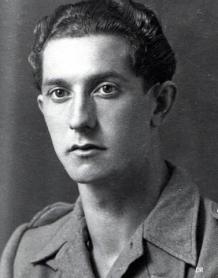Commander Robert, resistant, liberator of Foix

Il est né José Antonio Alonso Alcalde le 14 avril 1919, dans la région minière des Asturies. Il combat dans l’Armée Républicaine durant toute la guerre civile (1936-1939) qui oppose le gouvernement élu aux troupes du général Franco. Lorsque Barcelone, dernier bastion républicain, tombe aux mains des franquistes, début 1939, José Antonio Alonso Alcalde franchit à pied la frontière pyrénéenne comme plus de 450.000 Espagnols.
Comme nombre de ces exilés il est interné dans un camp. Après le déclenchement de la Seconde guerre mondiale, il est enrôle dans une Compagnie de Travailleurs étrangers puis rejoint, à l’automne 1943, en Ariège, les guérilleros au Col de Py (commune de l’Herm). Devenu Chef d’Etat Major de la 3éme brigade de l’Ariège sous le nom de Commandant Robert, il renforce et réorganise le maquis. C’est à lui que fera appel le groupe de quatre hommes dépêchés par les Alliés pour libérer la région, avec à leur tête le futur général Bigeard. La libération de Foix a lieu le 19 août 1944, sous son commandement et exclusivement avec des combattants espagnols. Il prend part ensuite à la bataille de Castelnau.
Le commandant Robert compte parmi ceux qui, en octobre 1944, tentèrent d’établir une tête de pont dans le Val d’Aran pour porter le combat contre le régime franquiste. Cette tentative échoue et, ne pouvant rentrer en Espagne, où Franco poursuit impitoyablement pendant de très nombreuses années les vaincus de la guerre, il est reconnu réfugié. Il devient Français en 1947.
José Antonio Alonso est citoyen d'honneur de la ville de Foix, chevalier de la Légion d'honneur, médaille d’or des Asturies, chevalier de la Légion de la République polonaise et médaille de la loyauté à la République espagnole